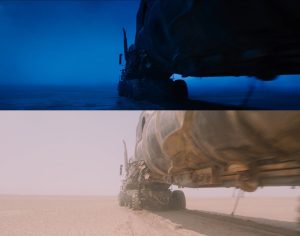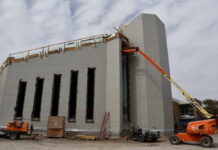After the delays from the pandemic, Denis Villeneuve has finally been able to put Frank Herbert’s science fiction classic on the big screen, or at least the first part of it. Yes, this story will be spread out between two films, there is no other way to tell a story of this scale. And scale is the integral term when discussing Dune, to say it is as big as 2001: A Space Odyssey is not an understatement.
Dune’s merits
This film, beyond its impressive scale, is wonderful. Villeneuve proves once again that he is one of the best filmmakers working today. Every shot is wonderfully composed, so much so that one could write an entire essay over any single shot in the movie. However, what I’ve come to appreciate so much about Dune is its atmosphere. This film builds such a cold and desolate atmosphere thanks to Greig Fraser’s incredible cinematography and Hans Zimmer’s best score since Interstellar.
However, the people behind the camera aren’t the only ones to thank for Dune‘s success because the cast is undoubtedly strong. There are no “Oscar scenes” in this film, but every actor gives a performance that really sticks with you.

I left the theater feeling somewhat divisive on my thoughts on Timothée Chalamet and Rebecca Ferguson’s performances as Paul and Lady Jessica. However, after sitting with the film for almost a week, they are my two favorite characters. They are both very cold and calculated, but they should be. Both characters reserve their emotions, creating tension between the two. Chalamet and Ferguson aren’t the only ones deserving of praise. Everyone involved gives such an interesting and satisfying performance. (*Note: Jason Momoa proves here he is the action hero America needs.)
Furthermore, in a film with so much scale and size, Villeneuve always focuses on the characters. When something big happens, it feels so much bigger because it is from the character’s perspective. There is a shot with so many explosions and effects, but Josh Brolin is the focus. Every blockbuster filmmaker should watch this film because it is one of the best in quite some time.
Dune and the modern blockbuster
Dune raises the question: “What if the Star Wars prequels were actually good?” This movie is abundant with space politics and exposition but is relayed fairly well. Dune makes exposition interesting with its presentation. A lot of blockbusters will give exposition, but it is told in a boring way or the comic way. The boring way is told bluntly with nothing else interesting going on. The comic way will insert a rather forced comedic bit within the exposition, which can really remove any bit of tension.

Another wonderful thing about Dune is that it feels expensive. So many blockbusters, namely Marvel films, have a color grading issue. In case you are unaware, color grading is a process of digitally correcting the footage and giving the film its look. Too many modern blockbusters lack style or voice. It usually takes someone with the track record of Christopher Nolan or Spielberg to make a blockbuster with any voice. I hope Dune gives studios the confidence to trust a filmmaker’s vision because it leads to better movies.
Dune is one of the few science fiction films of recent memory to invoke genuine tension. In a cinematic landscape riddled with franchises and cinematic universes, it is hard to actually fear for the characters. How am I supposed to be scared for a character in one movie if the sequel has already been announced? (Now Dune does have a part two in the works, but the film has legitimate consequences for nearly every character.)
Villeneuve continues his success from Blade Runner 2049, one of the best films of the last century, by allowing scenes to play out. There is a fight scene at the end of Dune that is relatively similar to the one in 2049 because of how simple they are. Villeneuve doesn’t film the action in a gaudy manner, he just lets the suspense of a simple fight ensue. The fight scene at the end of Dune had me gripping my seat because of how visceral it was.
This example fight from Dune is in direct contrast with modern blockbusters. Action now is so heavily done in a computer that it loses weight; therefore, it loses consequence. It is telling how tense I felt during a simple knife fight compared to how bored I felt observing the world being demolished by CGI creatures and heroes. It takes a true master to craft something so simple so effective.
Conclusion
Dune part one has its flaws. It can be a lot to take in on initial viewing, and it does have a deliberately slow pace that could turn off some viewers. But it is one of the few blockbusters in recent years that actually feels like an artistic expression. This film is not watered down by corporate executives or producers, but it is exuberant with passion from artists in every department. Dune part one is great, and more studios should follow suit and give filmmakers a chance to make their films.
Dune part one deserves a 4.5/5, but it’s closer to a 4 than a 5. This could change with part two’s release or rewatch, but I really loved this film. So go support it!






